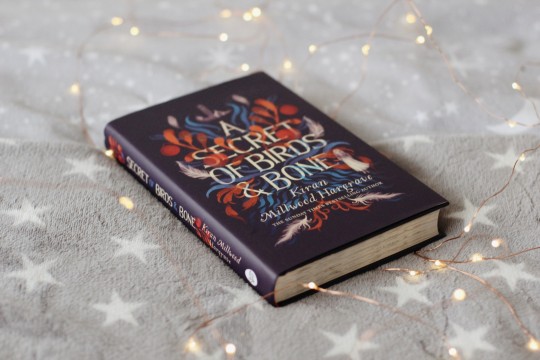Text
Five Exceptional Fantasy Books Based in Non-European Myth

Photo by Josh Hild
Don’t misunderstand me: I love reading well-written fantasy with roots in the familiar Celtic and English folklore of my childhood, but with the vast majority of High Fantasy being set in worlds closely akin to Medieval Europe, and a large amount of of Mythic Fiction drawing on legends of similar origin, sometimes the ground begins to feel too well trodden. There is, after all, an entire world of lore out there to draw from. That’s why I’m always thrilled to find excellent works of what I call “the Realistic Sub-Genres of Fantasy” based in or inspired by myths from other cultures. Such books not only support inclusiveness, but also expand readers’ experiences with lore and provide a wide range of new, exciting realities to explore. So, if you are looking for something different in the realm of Fantasy, the following novels will provide a breath of fresh air.

The Golem and the Jinni by Helene Wrecker
In this beautifully written novel, Wrecker draws on both Middle-Eastern and Jewish mythology to tell the stories of two unwilling immigrants in Edwardian New York and the unlikely friendship that springs up between them. Chava, an unusually lifelike golem created for peculiar purposes, has only days worth of memories and is practically childlike in her innocence. Ahmad the Jinni has lived for centuries, but is trying to reclaim his forgotten past. The former is as steady and calm as the earth she’s made from while the latter is as volatile and free-spirited as the fire within him. Both must learn to live in an unfamiliar new culture and find their places in a city too modern for myths even as they hide their true natures. It’s a wonderful metaphor for the experiences of immigrants everywhere, who often find themselves feeling like outsiders—isolated and even overwhelmed— as they struggle to adapt to life in an alien society.
Full of memorable characters, vivid descriptions, and interesting twists, The Golem and the Jinni takes readers on a journey that is driven as much by internal conflict as external action. The setting of 1900’s Manhattan is well-researched and spectacular in its detail. Wrecker blends two old-world mythologies into the relatively modern Edwardian world with a deft hand. The result is not only fascinating, but also serves to illustrate the common early-twentieth-century experience of an immigrant past colliding with an American future.

The Tail of the Blue Bird by Nii Ayikwei Parkes
One part Detective Mystery and one part Magical Realism, this novel invites readers to experience modern-day Ghana in a way that is both authentic and profound. When Kayo, a forensic pathologist just beginning his career, is pushed into investigating a suspected murder in the rural village of Sonokrom, the last thing he expects is to have a life-changing experience. Soon, however, he gets the acute sense that the villagers may know more than they’re letting on. When all of the latest scientific and investigative techniques fail him, even as odd occurrences keep dogging his steps, Kayo is finally forced to accept that there is something stranger than he thought about this case. Solving the crime will require more than intelligence and deduction; it will require setting his disbelief aside and taking the traditional tales and folklore of an old hunter seriously. Because whatever is happening in Sonokrom, it isn’t entirely natural.
This novel is brilliant not only because of its deep understanding of Ghanaian society and realistic setting, but also because of Parkes writing style. The narrative is gorgeously lyrical and everything within it is described with a keen, insightful eye. The dialogue is full of local color, and while some may find the pidgin English and native colloquialisms difficult to follow, I found that the context was usually enough to explain any unfamiliar terms. Sometimes the narrative feels a little dreamlike, but that is exactly the way great Magical Realism should be. The Tail of the Blue Bird insistently tugs readers to a place where reality intertwines with myth and magic, all while providing an authentic taste of Ghanaian culture.

The Deer and the Cauldron by Jin Yong
During the reign of Manchu Emperor Kang Xi, China is in a state of barely-controlled sociopolitical unrest. Many of the older generation remember the previous dynasty, and there still remain vestiges of a resistance movement hidden among the populace. As his forces continue to hunt down the malefactors, called the Triad Societies, the boy-emperor turns to his unlikely friend and ally: a young rascal known only as Trinket. This protagonist is a study in contrasts: lazy yet ambitious, cunning yet humorous, roguish yet likable, foul-mouthed yet persuasive. Born in a brothel, Trinket has made his way by his wits alone. At age twelve, he accidentally sneaked into the Forbidden City—a bizarre occurrence in itself—afterward befriending Kang Xi. Now, rising quickly through the ranks, he is on a mission to (ostensibly) find and weed out the Triad Societies, and he uses the opportunity to infiltrate various organizations, playing their leaders against one another for his own gain. With a dangerous conspiracy brewing in the Forbidden City itself, however, he is forced to choose sides and decide what is most important to him: friendship, fortune, or freedom. Supernatural occurrences, daring escapades, and moments of deep introspection abound as Trinket struggles to navigate the perilous maze his life has become.
This novel is like a gemstone: bright, alluring, and many faceted. At times it may seem somewhat simple on the surface, but looking closer reveals new depths and multiple layers. Full of intrigue, action, horror, and even laughs, The Deer and the Cauldron mirrors not only the complexities of its setting, but those of the China the author himself knew during the Communist revolution. By blending together history, fantasy, realism, humor, and subtle political commentary, Yong not only beautifully captures these social intricacies but also creates a narrative that is as thoroughly engaging as it is unapologetically unique.
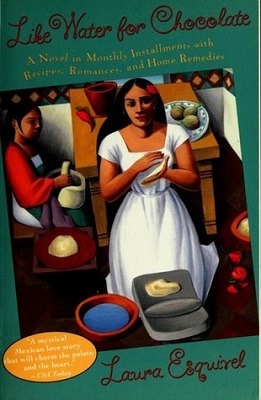
Like Water for Chocolate by Laura Esquivel
Magical realism related to food has almost become a movement in itself, with novels like Aimee Bender’s The Particular Sadness of Lemon Cake, Joanne Harris’ Chocolat, and Sarah Addison Allen’s Garden Spells all finding their places in readers’ hearts. Originally published in 1992, Like Water for Chocolate helped create this fascinating trend, and it has become something of a modern classic in the fantasy genre.
The narrative centers around Tita de la Garza, a mid-twentieth century Mexican woman possessing deep sensitivity, a strong will, and a special talent for cooking. Born prematurely, Tita arrived in her family’s kitchen, tears already in her eyes. It is in that room where she spends most of her childhood, being nurtured and taught by the elderly cook, Nacha. The relationship that flourishes between Tita and her caregiver is a special gift, as it provides the girl not only with the compassion and support her own mother denies, but also with a passion and skill for creating incredible, mouth-watering dishes. At Nacha’s side, Tita learns the secrets of life and cookery, but she also learns one terrible fact: thanks to a family tradition, she is destined never to have love, marriage, or a child of her own. Her fate, rather, is to care for her tyrannical widowed mother, Mama Elena, until the day the older woman dies. With a vibrant, independent spirit, sixteen-year-old Tita flouts this rule, falling deeply in love with a man named Pedro who asks for, and is denied, her hand in marriage. Undaunted, the young man agrees to wed one of Tita’s older sisters, Rosaura, instead, as he believes this to be the only way he can be close to the woman he loves. Thus begins a life-long struggle between freedom and tradition, love and duty, which is peppered throughout with supernatural events and delicious cuisine. So great is her skill in cooking that the meals Tita prepares take on magical qualities all their own, reflecting and amplifying her emotions upon everyone who enjoys them. Controlled and confined for much of her existence, food becomes her outlet for all the things she cannot say or do. The narrative itself echoes this, by turns as spicy, sweet, and bitter as the flavors Tita combines. At its heart, this is as much a tale about how important the simple things, like a good meal, can be as it is a story about a woman determined to be her own person and choose her own fate.
Cuisine is fundamental to this novel, with recipes woven throughout the narrative, but that is only a part of its charm. In the English translation, the language is beautiful in its simplicity. The characters often reveal hidden depths, especially as Tita grows up and is able to better understand the people around her. Heartfelt in its joys and sorrows, Like Water for Chocolate glows with cultural flavor and a sense of wonder. It’s a feast for the spirit, and like an exquisite meal, it never fails to surprise those who enjoy it.
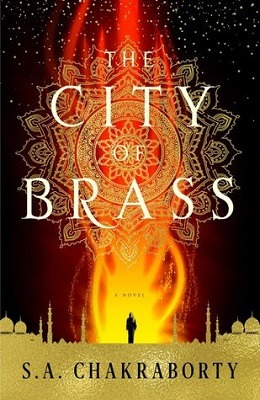
The City of Brass by S. A. Chakraborty
When I first read this novel, I found the early chapters enjoyable and engaging, but felt the story was no more than a typical, if especially well-written, work of mythic fiction. The deeper I got into the narrative, however, the more wrong I was proven. The City of Brass is anything but ordinary. While basing her work in Middle-Eastern lore and history, Chakraborty nonetheless manages to create a setting and story that are both wonderfully unique. Lush, detailed, and bursting with magic and intrigue, this book spans the lines between several sub-genres of fantasy without ever losing its balance.
Beginning in eighteenth-century Egypt, the narrative follows a quick-witted antiheroine. Nahri doesn’t live by the rules of her society. She doesn’t believe in magic or fate or even religion. Orphaned for most of her life, survival has required her to become a con artist and a thief. As a result, she is practical and pragmatic, a realist who has never even considered donning rose-colored glasses, and the last person who would ever expect anything supernatural to occur. Which, of course, means that it does, but the way in which it is handled is intricate and interesting enough not to feel trite. When Nahri’s latest con—a ceremony she is pretending to perform and doesn’t believe in even slightly—goes awry, and the cynical young woman finds herself face to face with a Daeva. Magical beings, it transpires, are real after all, and this one is furious. To both of their dismay, he’s also bound to Nahri, who soon realizes that he has an agenda of his own. In return for rescuing her (and refraining from killing her himself) Dara, the Daeva warrior Nahri accidentally summoned, wants her to pull of the biggest con of her life: pretending to be the half-human heir to the throne of his people. Worse still, she soon realizes that Dara, whose mentality sometimes seems a little less-than-stable, actually believes she may be exactly who he claims. He has something planned, and his intentions may not be in her best interest. Dragged unwillingly into a strange world of court intrigue, danger, social upheaval, and magic, Nahri quickly discovers that some things remain familiar. People are ruled by prejudices, the strong prey on the weak, and she can’t fully trust anyone. The stakes, however, are higher than ever, and Nahri will need all of her wits, cunning, and audacity if she wants to survive.
This novel was thoroughly enjoyable, and in fact prompted me to buy the following books in the trilogy as they became available. Chakraborty’s style is lyrical, her world building is superb, her plot is intricate, and her characters are well-developed. She not only frames unfamiliar words and ideas is easily-comprehensible contexts, but weaves those explanations smoothly into the narrative. The culture, mythology, and history surrounding her tale are all carefully researched, but the tale itself is nonetheless unique. What begins feeling like a fairly ordinary mythic fiction novel will pleasantly exceed readers’ expectations.
So, while we, as fantasy readers, love the works of authors like J. R. R. Tolkien, Marion Zimmer Bradley, and Charles de Lint, there is also a plethora of other enchanting books to enjoy. Exploring magical realism and mythic fiction based in cultures and folklore from all around the globe ensures that our to-read lists will always hold something unexpected and exciting to surprise us. So, if you’re starting to feel like you’re in a bit of a reading rut, or if you’re simply looking to expand your horizons, open up new realms of imagination by opening up one of the novels above. Who knows see where it will lead you? You may just discover a new favorite to add to your bookshelf. Happy reading!
#book#books#novel#novels#fantasy#mythic fiction#magical realism#non-European#culture#cultural#review#reviews#fantasy literature#literature#book lover#book lovers#bookworm#international#suggestino#suggestions#African#Mexican#Middle-Eastern#myth#mythology#legend#lore#Asian#Chinese#Central American
9 notes
·
View notes
Text
REVIEW: The Gospel of Loki by Joanne Harris

I have been a fan of Joanne Harris' magical realism since reading Chocolat, The Girl With No Shadow, and Peaches for Father Francis. Now, with this novel, Harris makes her first foray into mythic fiction, and she does not disappoint! Although this novel felt very different from the author’s previous works, and the language, at times, became somewhat denser, it was nonetheless a pleasure to read. The Gospel of Loki is well researched, displaying a commendable knowledge of Norse mythology, while still taking sufficient liberties with the source material to add surprises that keep the narrative interesting. As in all of her fiction, Harris' prose is enjoyable and fairly lyrical, her style is engaging, and her dialogue, though often somewhat sparse, is eloquent. (This is certainly an author who knows how to speak through characters' expressions and gestures, and who avoids superfluous conversations!) Loki as a character-narrator is a likable rogue; at times one is charmed by him, and at other one feels deeply for him. Added to all of this is a healthy dose of humor-- ranging from dry to satirical to "tongue in cheek"-- and a little dash of whimsy, making The Gospel of Loki a funny, intelligent, entertaining novel.
My only complaint, in fact, was that the characters are perhaps a little too archetypal-- although I suppose that is often expected from mythological figures. I believe there was a reason for this, but at times made the narrative much harder to relate to in those moments when characters became paper-thin. At times those characters even felt slightly juvenile. (Thor seems a bit like the quintessential bullying high school jock, etc.) The exception, of course, is Loki himself, and that does, admittedly, serve to highlight the protagonist's more complex personality. In fact, that seems to be exactly the point. Loki is the one telling the story, and thus readers are given Loki's perception of the Norse Gods: shallow, immature, and unlikable. I understand the technique and even find the idea brilliant, but for me, personally, it made some of the characters feel a little stale, and I would have liked to see them rounded out a little more.
All things considered, however, the The Gospel of Loki was a thoroughly enjoyable read which I feel is deserving of full stars. Well-written and diverting, sometimes hilarious and sometimes heartbreaking, this book is a delight. Harris sticks close enough to the mythology for reasonable accuracy while still adding and adjusting the tales enough to create an interesting narrative. The language is expressive and the humor is both sly and witty. I highly recommend this novel to any reader whose interest in mythology is matched only by their enjoyment of both good fiction and a good laugh.
At a Glance:
What do you rate this book? 5 Stars
What sub-genre of Fantasy would you categorize this as? Mythic Fiction
What are the main Fantastic elements? Gods, monsters, mythical creatures
Is this book suitable for YA readers? No
How should I obtain this book? Buy it
#book#books#novel#novels#mythic fiction#norse#viking#mythology#fiction#literary fiction#literature#humor#review#reviews#recommendation#Book Recommendations#Joanne Harris#Gospel#Loki#gods#thor#odin#myth
8 notes
·
View notes
Photo
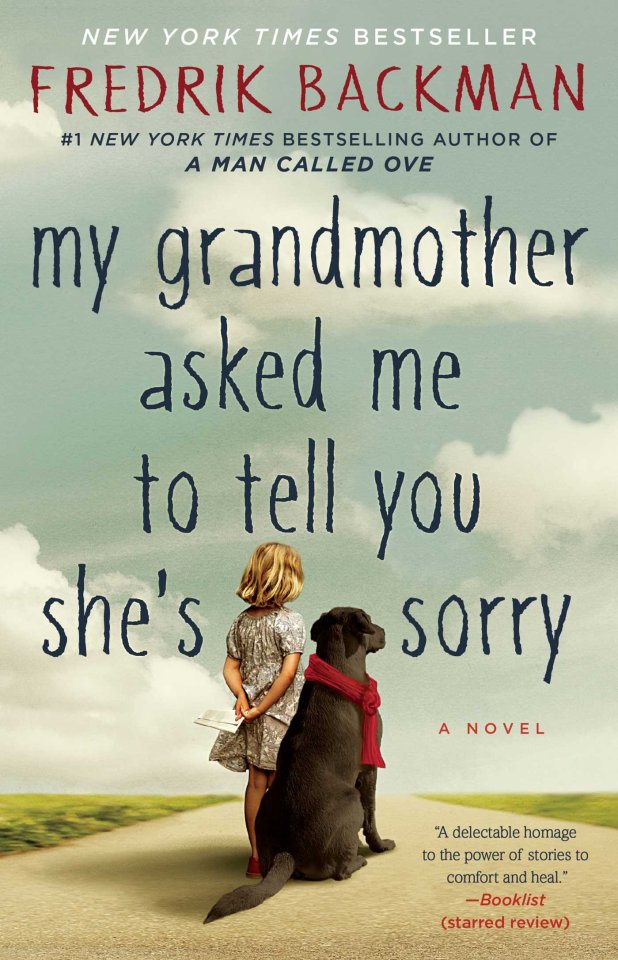
While less overtly fantastic than other books I review here, this novel has enough elements of Magical Realism that I felt it was appropriate to include it. Fredrik Backman has quickly become one of my favorite contemporary literature authors, and this novel, My Grandmother Asked Me to Tell You She's Sorry touched my heart in so many ways. A tale about childhood, first loses, and growing up, the narrative manages to capture the world from a child's point of view so truly that it may make readers remember ideas and feeling they haven't thought about in decades. Better still, it will recall the magic each once found in daily life because, more than anything else, this novel is about the power of stories and imagination. Filled with Backman's lyrical style, unique yet vividly accurate descriptions, and slightly quirky characters, My Grandmother Asked Me to Tell You She's Sorry is truly a treasure.
When seven-year-old Elsa's grandmother sets her the task of delivering a series of letters, the little girl finds her life turned upside. Not only do creatures and characters from her grandmother's magical bedtime stories appear to be invading real life, but even normal things are no longer simple and easy to understand. As she delivers each letter bearing an apology from her beloved grandmother, Elsa begins to realize that people aren't always what they appear, and sometimes understanding the story behind who someone became makes all the difference in the world.
Poignantly insightful, written in beautifully lyrical prose, and interwoven with gossamer threads of childhood fantasy, this novel is certain to enchant readers. The scenes vividly constructed, yet retain just enough vagueness readers from any nation can envision the narrative taking place in their home towns. The characters are interesting and a little quirky, each revealing enough about their feelings and motivations through their actions to make them feel deep, well-rounded, and real. Backman finds the perfect balance in his novel’s pace, allowing readers to share Elsa’s experiences and discoveries without ever bogging the narrative down. I would recommend this book to anyone who enjoys good contemporary literature, and whose heart is still able to feel the touch of magic and whimsy.
At a Glance
What do you rate this book? 5 Stars
What sub-genre of Fantasy would you categorize this as? Magical Realism, but only barely. This novel straddles the line.
What are the main Fantastic elements? Imaginary worlds, mythical creatures, possible magic.
Is this book suitable for YA readers? Depending on individual reading levels, yes. Adult and YA readers alike would probably enjoy this book.
How should I obtain this book? Buy it!
#book#books#novel#novels#review#reviews#book review#recommendation#Book Recommendations#fredrik backman#Grandmother#Asked#Tell#You#Sorry#Regrets#Magical Realism#Magical Real#literary fiction#fiction#grown up#fantasy#adults
0 notes
Photo
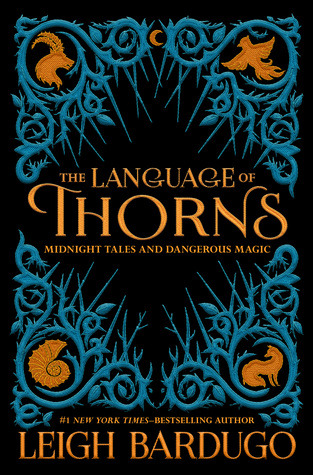
Leigh Bardugo's Language of Thorns is a collection of short stories largely related to classic fairy tales. However, these are no simple children's stories. Imaginative and well-written, each tale puts a twist on familiar folkloric tropes. Each brings with it a different question or observation about life, as well as an interesting blend of cultures.
In "Ayama and the Thorn Wood" a kingdom influenced by South American culture sees a very different version of Beauty and the Beast in which the "beauty" is anything but, and the beast's true curse stems from his father. The tale seems to ask readers: "what really makes a monster?" "The Witch of Duva," set in a very Eastern European land, not only turns typical good and evil archetypes on their heads, but also touches on very adult questions. It seems to use a fairy tale trope as a metaphor for something even more sinister. The last story in the collection, "When Water Sang Fire," explores how a classic fairy tale villain came to be, and succeeds in making reader cheer for the "bad guy."
I enjoyed reading this collection, and found the tales interesting, but honestly, by the time I finished the last story, the fairy tale tropes had become a little too expected, almost stale. That is the only reason I gave this four stars instead of five. Nonetheless, if you like fantasy and fairy tales, and enjoy stories that put new twists on old ideas, I still recommend that you read The Language of Thorns.
At a Glance
What do you rate this book? 4 Stars
What sub-genre of Fantasy would you categorize this as? Mythic Fiction
What are the main Fantastic elements? Magic, mermaids, enchanted forest... basically classic fairytale magic
Is this book suitable for YA readers? Some might miss many of the metaphors, but I wouldn’t call it unsuitable
How should I obtain this book? Buy it on sale
#fantasy#book#books#novel#reading#review#Language of Thorns#fairytale#retold fairy tales#retelling#folktales
10 notes
·
View notes
Photo
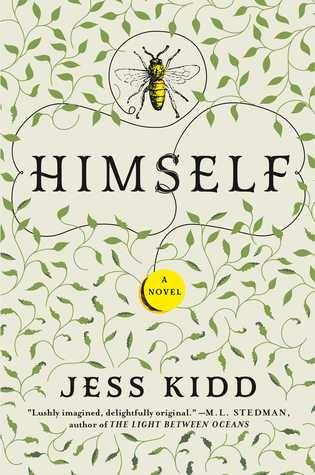
In 1970's Ireland, Mahony, a charming and handsome young man with questionable morals and an even more questionable background, returns to the rural village where he was born. For most of his life, Mahony has believed that his mother, widely acknowledged to be a teenage troublemaker, simply abandoned him, but a chance comment has made him question everything. What really happened two decades ago? Is Mulderrig, the scenic and conservative little Irish village where Mahony's life began, hiding a dark secret? Does it have something to do with Mahony's unknown father? And is that connected to why strange things keep happening?
Jess Kidd weaves a dark and enchanting tale around these questions while also raising some of her own about family, society, and how people as a whole deal with those they can't understand. The last is perhaps the central theme of this narrative's plot as it explores just how much humanity can justify where someone classifies as “other” is involved. Peopled with interesting and often quirky characters, Himself explores the place of outsiders in society as well as how those who fancy themselves "normal" react to them. More than that, it questions what society as a whole fears versus what it should fear. The straight-laced population of Mulderrig, led by the parish priest, are threatened by Mahony's modern ideas and loose morals. Even more than that, they are threatened by the dangerous questions he's asking and the negative memories he's stirring up. Perhaps what they should worry about, however, is one of their own. The more Mahony follows a trail of clues and inexplicable occurrences, the more he becomes convinced that one of the seemly godly men in the village’s midst is a murderer.
Kidd doesn’t simply infuse the novel with fantastic elements, but uses those elements to inconspicuously emphasize the narrative’s themes. Resentment and uncomfortable recollections are not the only things Mahony stirs up, however. His presence not only binds together the village's few eccentric outsiders but, in a sort of metaphor for the effect delving into the past often has, also wakes the spirits of Mulderrig's dead. As he searches relentlessly for the truth about his mother, and what became of her in the end, Mahony begins inadvertently forcing residents of the quiet settlement to examine their own buried secrets. His determination creates a rift in Mulderrig as locals choose to either help or hinder him, at the same time choosing to either face or ignore their own personal shame. Thus the narrative creates an undercurrent of confrontation between social freedom and the strictly maintained illusion of morality. Between this and the often-subtle supernatural occurrences, Mulderrig may never me the same.
One part slice of life, one part fantasy, and one part mystery, Jess Kidd weaves a marvelous tale about family and friendship, about dark truths and pretty lies, and about the presumptions and prejudices that rule society. The author writes in a style that manages to be both literary and hard-hitting, and that works perfectly in a novel that blends gritty reality with the fantastic. Himself is an engaging tale of Magical Realism replete with love, loss, and the darker side of society we all try to ignore. I definitely recommend this novel to anyone who loves both literature and good fantasy.
At a Glance
What do you rate this book? Five Stars
What sub-genre of Fantasy would you categorize this as? Magical Realism
What are the main Fantastic elements? Magic, Folklore, possibly Fey
Is this book suitable for YA readers? No. Not even a little.
How should I obtain this book? Buy it!
#fantasy#magical realism#Himself#book#novel#review#books#novels#recommendation#Book Recommendations#reviews#Jess Kidd#Irish#Ireland#mystery#murder#literature#fiction#literary fiction#book lover#fantastic#realistic fantasy#speculative fiction
2 notes
·
View notes
Photo
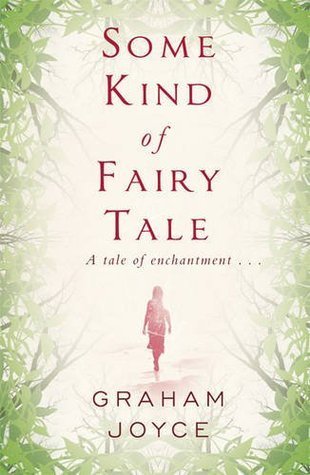
Perhaps one of the best experiences a reader can have is picking up a novel by a less-know and unfamiliar author. That was certainly the case with Graham Joyce’s Some Kind of Fairy Tale. This book was far more than anticipated: more enthralling, more thought-provoking, more enjoyable.
Set in a small town residing near an ancient fault line in Leicestershire, England, a daughter knocks on her parents' door to pay a Christmas visit. This would be perfectly normal except that this young woman, Tara, disappeared without a trace twenty years before. Her sudden return throws her family into a confusion of joy and suspicion. Where has she been all this time? Why did she never contact them to let them know she was alright? Strangest of all, why, in the two decades she's been gone, has Tara hardly aged a day?
Her older brother, Peter, deeply distrusts her story that she's been hitch-hiking from place to place. Her ex-boyfriend, Ritchie, who spent years shadowed by the suspicion of her disappearance, feels he's owed a better explanation. When Tara finally opens up, however, her tale is too strange for either man to believe. Tara, as the title of the book suggests, was taken by the Good Folk, and in the six month she dwelled with them, twenty mortal years have passed.
Is Tara telling the truth, is she lying to hide some dark secret, or is this a psychological episode brought on by extreme trauma? As her family tries to determine what's real, Tara feels increasingly alienated. Perhaps, however, she is not so alone. Graham Joyce opens several chapters with excerpts from a century-old murder trial in which the victim was killed on suspicion of being a Fey changeling. Tara herself discovers that, fifty years earlier, another young woman reappeared after a long absence claiming to have been "away with the faeries," and suffered the worst 1950's mental asylums had to offer as a result. The message is clear: being different is dangerous.
At it's core, that is a large part of what this novel is about. The other major theme is the nature of love. Regardless of whether he is a figment of her imagination or a real immortal person, Hiero, the Fey man who invited Tara away, is quintessentially Other. He hails from a different world with different norms. Nonetheless, he is also sincere, kind, charming, and attentive. On a deeper level, Hiero might represent an adoring lover from a different nationality or culture, and the tug-of-war between Tara's family and her honest belief in her experiences might be said to echo the conflict between the deep love and familial acceptance that often clash in such relationships. In a way even Tara is afraid to embrace the way she feels about someone so divergent from the typical. The contentions between perceived normalcy and desire for something more, between a near-perfect love and the blunter realities of daily life, and between the belief in magic and what society accepts as truth are also vital to the story. Will Tara's family ever understand what happened to her? Can Tara herself reintegrate into society? Does she even still belong in the life she once knew? And what sacrifices might her choice require?
I truly enjoyed this novel, and would recommend it to anyone who loves good fantasy, fairy lore, and books that promote deeper thought about human nature.
At a Glance
What do you rate it? Five Stars!
What sub-genre of Fantasy would you categorize this as? Possibly Mythic Fiction because it draws on folklore; possibly Magical Realism.
What are the main Fantasy elements? Fey (Fairies,) changelings, and folklore
Is this book suitable for YA readers? No. It contains sexual references and explicit language.
How should I obtain this book? Buy it from the bookstore!
1 note
·
View note
Photo
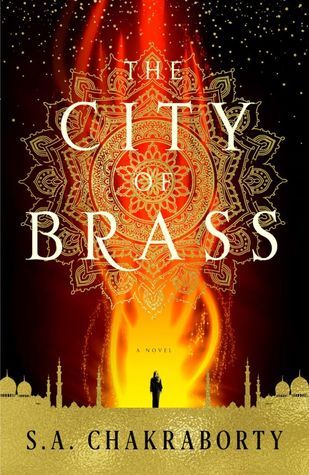
Firstly allow me to say that I was thrilled I am to see more Fantasy drawing from the mythologies of various cultures. Don't misunderstand me; I still love Fantasy influenced by European myth and legend as well, but it's wonderful to read something involving a different part of the world.
S. A. Chakroborty's The City of Brass starts off a little slow, and in fact at first seems as if it will be just another story about a human girl falling in love with a supernatural hero during the course of an adventure. Keep reading and give it a chance. You'll be happy you did. As the narrative progresses, it deepens to become an intricate tale of political intrigue, and opposing cultural and religious factions that mirror, in some ways, issues relevant today in much of the Eastern world. The hero, while alluring, if flawed and complex enough to be very interesting. The protagonist can be a little angsty and immature at times, but it is limited enough to make her seem like a real adolescent dealing with things well beyond her age.
Writing with an insider's understanding of culture and religion, Chakroborty creates a colorful world populated by Devas, Djinn, and other magical creatures. Everything from clothing to customs are described with matter-of-fact details that allow even someone largely unfamiliar with them to build an understanding without interrupting the flow of the narrative. The story is well-wrought, helping readers to experience the protagonist's emotions and share in her uncertainty about who can be trusted. The ending leaves you hungry to learn what will happen next. If you enjoy Fantasy, and are searching for something different in the genre, I definitely recommend The City of Brass.
At a Glance
What do you rate this book? 5 Stars
What sub-genre of Fantasy would you categorize this as? Mythic Fiction
What are the main Fantastic elements? Daevas, Djinn, immortal beings, magic
Is this book suitable for YA readers? Yes, depending on reading level
How should I obtain this book? Buy it from the bookstore!
3 notes
·
View notes
Photo
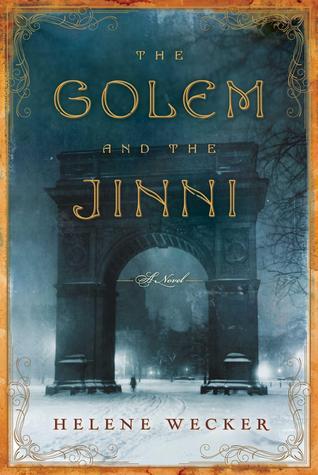
**NOTE: I am not certain if anything contained in this review might be considered a spoiler. I do not relate any vital details about the plot, but I do delve into some fairly descriptive characterizations that might, broadly, affect you while enjoying this novel. Please read with caution.
This book was highly recommended, and I was not disappointed. As with S.A. Chakraborty's The City of Brass, I was gratified to see non-European mythology given center stage in such a wonderful novel. (I love European myths, especially Celtic, but it's good to see more variety in fantasy literature.) More that that, however, Helene Wecker's The Golem and the Jinni is an engaging and enjoyable read for it's own sake.
Wecker captured my attention from the beginning and held it throughout the novel. Her well-researched and entertaining narrative spins together Middle-Eastern and Jewish mythology against a setting of Edwardian Era New York City so detailed you almost feel you could use it as a map. I quickly became invested in the main characters, and couldn't wait to learn what happened to them next. The tone and style fit the novel's setting of dingy-but-respectable New York immigrant neighborhoods. It was descriptive, but not lyrical, and I found it neither too flowery nor to plain.
Perhaps what I loved most about this book, however, is that, while, as the name suggests, it is about a golem and a jinni, in many ways it is not. Wecker cleverly uses the natures of both supernatural beings to explore humanity. As a result, as well as being a fantasy, this is a novel about a reserved and socially-awkward young woman struggling to find a middle ground between traditionally expected dutifulness and the rising social freedom of women in Edwardian America. It is also about a young, brash, fiery man, accustomed to youthful self-indulgence, learning to shoulder the burden of responsibility. (Indeed, the jinni being trapped in his human form could be viewed as a metaphor for a nineteen or twenty-year-old boy finding himself suddenly stuck in the role of a man.)
There is a more general exploration of humanity as well. Both the golem and the jinni, for differing reasons, find themselves in Edwardian New York City without having had a choice in the matter, and without any real understanding of the place and time. This echoes, in many ways, the immigrant experience during the Victorian and Edwardian eras, when citizens from poor families around the world found themselves pushed by promise or desperation to America. Like the jinni and golem, they found themselves in an alien city of unfamiliar architecture, rules, and cultural customs. Indeed, even the protagonists' feelings of otherness, and their fear that people around them could never understand and accept what they are, mirrors the concerns of a stranger in a strange land. The experiences of the jinni and the golem are magnifications of immigrant life.
Most of all, however, this book is about what it means to be a person. The golem and the jinni, though one is of supernatural origin and the other is a construct, are deeply and remarkably human. Wecker never needs to tell you what her protagonists are feeling-- their actions and words, interlaced with occasional thoughts, make it clear. They are flawed but lovable, and you feel every warm moment and bruising argument of their eventual friendship in your own heart. It is easy to relate to them, to feel for them, and hope for them. That, combined with their outsiders' views of society, allow us not only to explore ourselves, but to ask: what makes us human?
If you enjoy mythology and good books, if you are looking for mythic fiction that both entertains and makes you think, I highly recommend The Golem and the Jinni.
At a Glance
What do you rate this book? 5 Stars
What sub-genre of Fantasy would you categorize this as? Historical Fantasy, Mythic Fiction
What are the main Fantastic elements? Folklore, Supernatural Beings
Is this book suitable for YA readers? Depending on the reader. There is nothing strongly inappropriate, though there are some vague sexual references.
How should I obtain this book? Buy it!
#fantasy#book#books#novel#review#golem#jinni#historical fantasy#historical fiction#mythic fiction#book review#book reviews#immigrants#culture#cultures#novels#fiction#book recommendations#book recommendation#book lovers#Book Lover#read#reading#reader#readers#myth#mythic#djinn#folklore#history
0 notes
Photo
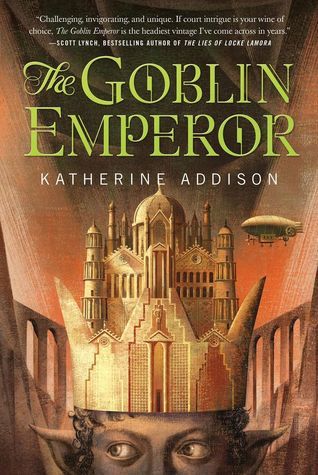
I loved this book despite the fact that it wasn't quite what I expected, or perhaps even because of that very fact. The Goblin Emperor was unexpectedly refreshing. Mostly, however, I loved it because it was simply very good.
A few of the greatest monarchs in history have spent at least a part of their youths in exile, and have differed somehow from the "typical" regent. This novel draws on that truth, and indeed there are a few subtle echoes of Queen Elizabeth I and Queen Victoria's early reigns. Mixed-blood Maia is the youngest (and least liked) son of the Emperor of the Elves. He has been raised in a small, rural estate without wealth, royal favor, or friendship. When an unexpected tragedy puts Maia on the throne, he is suddenly flung into an unfamiliar world of intrigue, politics, and social decorum. Worse, there may be conspiracy lurking beneath the surface. Maia must learn fast what to do, who to trust, and how to rule. Filled with opposing sociopolitical issues and realistic intrigue, this book managed to convey the confusing reality of a boy called upon to rule a kingdom where concerns are far from black and white.
This novel is fairly unique in the Fantasy genre. The plot is character driven, filled by court intrigue and internal struggles rather than adventure. Katherine Addison shows herself to be a masterful hand and world building, creating a magical steampunk setting with culture all it’s own. The language is antique, but rather than being distracting, it helped me to fall more completely into this world. In part, that is because Addison understands how to use this older form of English, avoiding cliches and making the style easy to read. This is true even with the addition of a few different-- and possibly invented-- grammatical rules. (For example, the formal "we" as opposed to the informal "I.") It says something about Addison's skill in cultural world building that this didn't detract from the novel in the slightest.
Perhaps what I liked the best, however, was the protagonist. Maia is, quite simply, lovable. He is a sincerely good person while still being flawed. He is sweet without being sugary, awkward without being absurd, stronger than he seems, and indisputably intelligent. In short, Maia will make readers remember what it felt like to be high school freshmen in unfamiliar halls, eager to prove themselves and unsure how. That makes it easy to empathize with this character. Addison managed to find a realistic balance in this character, imbuing him with self-doubt while avoiding making him weak or angsty. In fact, I saw my own inner uncertainties reflected in his insecurities. You can't help but cheer Maia on as he tries to find his bearings in his new role.
Of course, he isn't the only likable character. There is Csevet, the trust-worthy secretary without whom Maia would be lost, Beshelar, the gruff but kind Nohecharis (or personal guard,) and Cala, a mage and Nohecharis who is perhaps a little too tender-hearted for his job. There is young Prince Idra, Maia's nephew and unexpected ally, who knows far more about court politics than his new emperor. These are just a few of the characters who help or hinder Maia as he tried to quickly grow from teenage boy to emperor.
Most of all, Addison did a fantastic job balancing every aspect of her novel. As mentioned before, Maia is confused but not incapable, good but imperfect, unsure and sometimes stressed but not angsty. The "villains" are never purely bad, nor are the more positive characters purely good. The sociopolitical issues Maia must deal with realistically complex, and there is often no clear right answer. The court intrigues are intricate, convoluted, and pragmatic enough to be found in the histories of any Renaissance royal court. Nonetheless, all of these realistic aspects are found in a unique and well-developed fantasy setting.
All of this combined to make a thoroughly enjoyable novel. From start to finish, The Goblin Emperor is endearing and enchanting. If you enjoy good fantasy, court intrigue, coming of age stories, and old-world speech, you will love this novel. However, if vaguely Shakespearean-esque language and political intrigue are not your things, this may not be the book for you.
At a Glance
What do you rate this book? 5 Stars
What sub-genre of Fantasy would you categorize this as? It’s tough to categorize... Steampunk Fantasy with a Realistic Flair?
What are the main Fantastic elements? Elves, magic, magical world
Is this book suitable for YA readers? There’s no inappropriate content, but the archaic language and lack of action may prove dull for some youth.
How should I obtain this book? Buy it from the bookstore!
4 notes
·
View notes
Photo
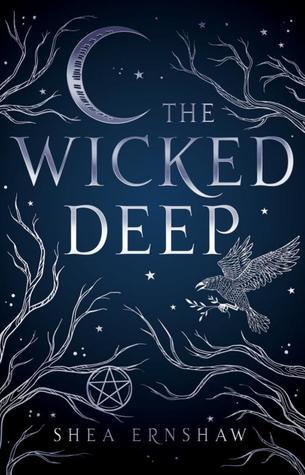
One part Practical Magic and one part Hocus Pocus, with just a hint ofGarden Spells mixed in, Shea Ernshaw's The Wicked Deep takes readers to a small fishing town that has been cursed for two-hundred years. The Swan sisters never considered themselves witches; their unusual powers of attraction were just that, and their skill at creating perfumes that inspired particular emotions were nothing more than adept manipulation of oils and scents. Unfortunately, the people of their adopted town, Sparrow, didn't agree, and the Swan sisters were drowned in the ocean.
Now, two centuries later, the town harbors a dark tradition. Once a year, between June 1st (Litha) and Midsummer, the sisters return to take their revenge, drowning teenage boys in the same salt waters that claimed their own lives. This year, however, something is going to change. When an antisocial girl and a stranger newly arrived in Sparrow set out to discover how the curse might be broken, they find more than they bargained for. Can love really end the spell born out of vengeance and heartache?
Ernshaw weaves her story with a lyrical style, filled with descriptive language that is both beautiful and often wonderfully unusual. She creates a slightly quirky town by lacing together characters who, often, are just a little touched by magic themselves. A hautingly beautiful song echoes across the waves. A young man searches for answers he's half-afraid to find, a lonely widow reads futures in tea leaves, and a bakery serves up tiny cakes with unique, delicious flavors that banish bad memories. Some of the other supporting characters are, honestly, rather flat, but the story itself more than makes up for it. Ernshaw's narrative grabs you and won't let go.
The Wicked Deep may be a Young Adult novel, but it is intricate and well-written enough to be enjoyed by Fantasy readers of all ages. I figured out the protagonist's secret several pages before it was revealed, but it wasn't so obvious that it rendered the story dull. The town of Sparrow often feels real, and the major characters are interesting. I greatly enjoyed reading this novel, and would recommend it to those looking for a modern Fantasy book that brings the supernatural into the mundane world with just a touch of witchy magic.
At a Glance
What do you rate this book? 5 Stars
What sub-genre of Fantasy would you categorize this as? Urban fantasy, despite it’s small town setting
What are the main Fantastic elements? Magic
Is this book suitable for YA readers? Yes
How should I obtain this book? Buy it
1 note
·
View note
Photo
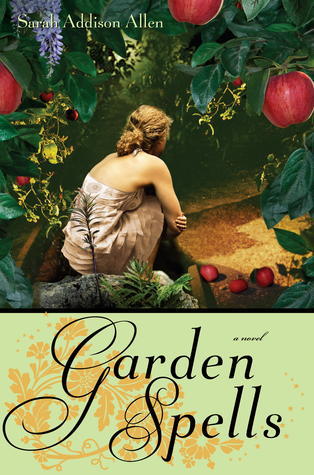
Sarah Addison Allen weaves a beautiful story about family, feminine strength, and the magic that touches daily life if you only dare to look for it. Sisters Claire and Sydney Waverley have been estranged for years. Sydney couldn't wait to escape their small Southern town, where every family seems bound to some sort of tradition, and women in her own family are whispered to be witches. Claire, on the other hand, loves living in their Queen Anne family home, where she has built a successful catering business using the unique culinary traditions of her grandmother.
Claire's food is more than delicious. Using flowers from the garden that has flourished for generations around an unusual apple tree, she creates dishes that can inspire particular emotions in anyone who tastes them. The apple tree itself is the strangest of all, bearing out-of-season fruit that is locally believed to offer glimpses of the future. It is exactly this enchanting tradition that Sydney left town to escape. She wanted to be different in her own way, forging her own path, rather than being one of the magical Waverley women. When trouble sends her running, however, Sydney has no choice but to return home with her young daughter.
Sydney and Claire must find a way to reconnect, learning lessons about love and forgiveness along the way. Reminiscent of Alice Hoffman's Practical Magic and Joanne Harris' Chocolat, Allen's novel is full of literary charm, free-spirited female characters, and the magic of sisterhood. The women in this novel need one another, whether they're willing to admit it or not. Can Sydney teach Claire to find the courage to take a chance on love? And can Claire help Sydney come to terms with who she is, where she came from, and the magic that is an inexorable part of both? Neither will be able to truly find her place within their wonderful little home town until they do.
I truly enjoyed this novel. Allen spins a lyrical narrative resplendent with sisterly affection, subtle magic, and Southern charm. My only qualm was the way the final confrontation ended; it seems a little too contrived. That, however, was not enough to distract from the novel as a whole. Populated with interesting characters-- from the old Aunt who feels compelled to give people things before they know they need them, to the kindly gay friend determined to change fate-- Garden Spells will enchant readers from start to finish.
At a Glance
What do you rate this book? 4 Stars
What sub-genre of Fantasy would you categorize this as? Magical Realism
What are the main Fantastic elements? Magic
Is this book suitable for YA readers? No, not really. There’s a (relatively mild) rape scene, and some of the themes may be a little too mature for young readers.
How should I obtain this book? Buy it at the bookstore!
0 notes
Photo
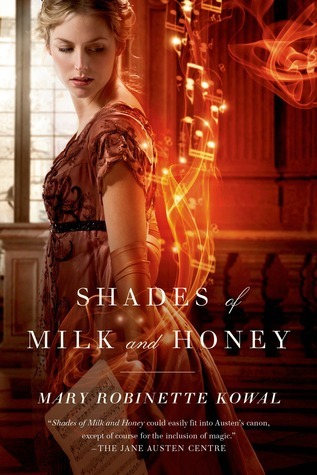
I like the works of authors such as Jane Austen, and I like fantasy, so it is no surprise that I would enjoy the subgenre of Gaslamp Fantasy. However, in my experience, such books all too often lack sufficient historical research to make the settings believable. This novel, however, is a notable exception. The tone and style is strongly influenced by Jane Austen's writing, and is accurate enough to not seem like a poor attempt at imitation. The historical aspects are largely correct, and I found the fantasy aspect to be unique and enjoyable.
Eligible ladies Jane and Melody live in an alternate version of Regency England, and like most Regency heroines they are expected to have one primary goal: marriage. Melody is unequivocally the more beautiful of the two, but what Jane lacks in looks she makes up for in accomplishments. Specifically, she is an excellent glamourist: one who uses magic to create living art. In fact, she is far better at it than even a lady of breeding is expected to be, having obtained a professional level of competence. That, essentially, is the issue. Jane isn't certain she wants to be married; she'd rather pursue her passion for magic. Nonetheless, she is told that marry she must-- but she is determined not to marry unless her husband can share her passion for her art as well as a deep and abiding love.
Filled with the refinement and genteel beauty of a Regency romance, this is as much a story about a young woman struggling with the expectations of society as it is a unique fantasy novel. Jane adapts to social situations and dodges family scandal while simultaneously trying to remain true to herself. Will Jane have to sacrifice her dreams, or can she find a balance between achieving her desires and fulfilling her family's wishes? And, if she cannot, will she find the strength to dare public censor? If Jane Austen had written a fantasy novel, it might have looked something like this.
At a Glance
What do you rate this book? 5 Stars
What sub-genre of Fantasy would you categorize this as? Historical Fantasy
What are the main Fantastic elements? Magic
Is this book suitable for YA readers? Sure. Anyone who likes both Jane Austen and fantasy will enjoy this novel.
How should I obtain this book? Buy it, or at least buy it on sale.
0 notes
Photo
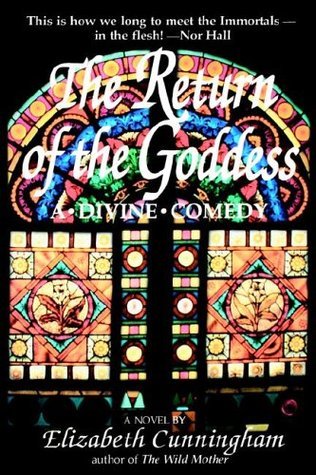
I am so glad I happened upon this book! Esther Peters is an obedient, subservient wife who married her husband because it was expected. Her whole existence, in fact, has been ruled by the expectations of others... until, that is, the Mother Goddess enters her life as subtly as a whisper. It's a simple beginning: Esther unwittingly creates a play dough image of the Goddess on Samhain, or Halloween, a traditional time of endings and transitions. This seemingly innocuous event sets her on a path to changes and self-discovery, and neither Esther nor the small town of White Hart may ever be the same.
Written with both humor and a keen eye for human nature, The Return of the Goddess takes the protagonist on a new and unfamiliar journey. Esther finds herself gradually embracing the joy of living along with a new sense of self-worth, daring to feel beautiful and alluring, dancing when no one can see. The changes in her personality, however, inevitably cause friction. Esther must make a choice: be true to herself and, for the first time, take control of her life, or fall back into the routine of doing what's expected by her husband, her small town, and her religion. One path promises freedom and fulfillment, but demands that she find the courage to stand on her own, while the other is comfortably familiar, but leads to a continuous cage of self-denial and subjugation.
While also a rare and wonderful work of Pagan fiction, at it's core, The Return of the Goddess is about the inner self warring with social norms. Caught in a tug-of-war between two factions-- her husband, an ambitious Episcopal priest, with self-righteous members of his flock on one side, and a motley crew of eccentrics and outsiders on the other-- Esther must choose whether she will be true to herself, or once again take the easier path of relinquishing control to convention. Helped along by a wealthy, vivacious old woman, an elderly mystic, a handsome stranger, and even a family of more open-minded parishioners, will Esther find the strength of will to embrace the Goddess nature within herself? Will the changes she's experiencing create the full and happy life she craves, or simply rip her world apart? It's hard for anyone to stand for who one is and what one believes when so many stand in opposition. Throughout the course of a year measured, unbeknownst to Esther, in sacred days, she must find the courage to take her own spiritual journey... and, on the way, learn that there may be far more than just her happiness at stake.
Full of insight, magic, and humor, The Return of the Goddess was a true pleasure to read. My only real qualm with the work, in fact, was that, despite being something of a feminist myself, there were a couple of points at which I found the novel a little "preachy." However, other than those two small parts, when Cunningham seemed to momentary forget herself and begin pushing a message, I found The Return of the Goddess utterly charming. So charming, in fact, that I was more than willing to overlook the brief lapses into sociopolitical sermonizing.
I greatly enjoyed this novel, finding it enlivening and uplifting. The characters are quirky and interesting, and the story engaging. Deep and multilayered, the narrative itself is by turns humorous and heartwarming. Some passages made me chuckle, while other filled me with a tender warmth. The lines drawn between characters are not rigidly straight; while this novel does involve controversy between religious ideals, it is not a simple matter of Christianity verses Paganism. (As mentioned before, Martin's relatives, who grow to support Esther in her search for self-realization, are, in fact, Christian.) Elizabeth Cunningham's narrative is far more complex than that. This is a book about a woman discovering that she has been called by the Goddess all along, though she was too buried in dutiful expectations to hear it, and seeking the strength to become her own person despite social censure. Perhaps because of this, many of the whispered truths hidden throughout the novel transcend religious boundaries.
Nonetheless, The Return of the Goddess is also a beautifully Pagan novel full of ancient symbolism and the bright, warm, joyous spirit of the Sacred Feminine. The Goddess flows throughout the entire narrative, sometimes a gentle trickle, sometimes a laughing stream. Elizabeth Cunningham weaves subtle magic along with the sacred power of the natural world and the female soul into every page. Good Pagan fiction like this is all too rare. In fact, I loved The Return of the Goddess so much that I read it twice while I had it from the library, and then purchased a copy of my own.
I would definitely recommend this novel to any book-loving witch, Wiccan, or fellow Pagan, as well as to any open-minded woman who enjoys good contemporary literature off the beaten path. I will, however, warn you that the staunchly conservative may feel insulted by the religious controversy within this book. However, if you have an open mind and you embrace the Goddess within yourself, or are ready to try to do so, you will love Cunningham's funny and uplifting novel.
At a Glance
What do you rate this book? 5 Stars
What sub-genre of Fantasy would you categorize this as? Magical Realism, as well as Pagan Fiction
What are the main Fantastic elements? Magic (if you want to call the magic in this novel fantasy.)
Is this book suitable for YA readers? Probably not. It’s a little deep for most YA readers, and it contains some sexual references.
How should I obtain this book? Buy it from the bookstore!
#fantasy#book#books#novel#review#Pagan#witch#witchy#magick#magical#return#goddess#divine#comedy#femisnism
1 note
·
View note
Photo
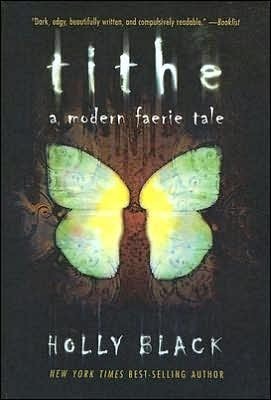
What would you do if you found out your imaginary childhood friends were real?
Kaye Fierch has spent much of her sixteen years travelling with her mother, a small-time rock musician. She loves the free-and-easy lifestyle, and thus is, naturally, irritated when she she and her mother return live with her straight-laced grandmother in a small, dingy town. Her mother isn't much happier, but the arrival of a hauntingly alluring man at her mother's last gig, and the sudden abusive turn of her latest boyfriend, leave them with little choice.
Kaye still half-believes in her old imaginary friends, three Fey who lived in the woods, but when they fail to show she accepts that that it's time to grow up and move on. Until, that is, while helping a stranger, she gets more than she bargained for. Finding herself unexpectedly embroiled in the concerns of the Fey, Kaye now has no choice but to believe that her imaginary friends were real, immortals exist, and something in the local Faerie courts is very wrong. Roiben, the real-life faerie knight she saved, may either be the only person who can help her, or the one who will seal her doom.
On the surface, Tithe may seem like another typical teenage fantasy novel, but it is saved from that fate by Holly Black's skillful style and voice, as well as her notable grasp of folklore. It's clear that Black is well-versed in European fey myths, and that makes the novel infinitely more enjoyable. The often-quirky characters also help to set the book apart.
This is, of course, still light reading-- what I call "ice cream in book form." But it's extremely good ice cream. In fact, Tithe is a wonderful novel for when you want to read something simply and spectacularly enjoyable that still has some substance. Amateur mythologists like myself will appreciate the accuracy of the folklore, while anyone who likes a good fantasy book will enjoy the narrative. Well-written but not heavy,Tithe is fantastic fun.
At a Glance
What do you rate this book? 4 Stars
What sub-genre of Fantasy would you categorize this as? Urban Fantasy
What are the main Fantastic elements? Fey (Faeries, Fairies) folklore
Is this book suitable for YA readers? Yes
How should I obtain this book? Buy it on sale
0 notes
Photo
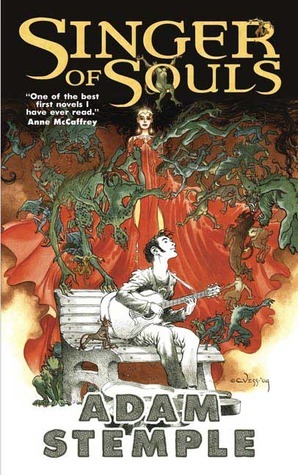
I wanted to like this novel. I really did. I was excited about reading it because it seemed like a tale I was certain to love-- a fantasy based in Celtic folklore and set in Scotland. Perhaps if I had expected less, and not raised my hopes, it wouldn't have felt quite so lackluster. I don't believe anything could have saved this novel from receiving a fairly low rating from me, however... The ending ensured that.
Perhaps that's what saddened me most about this novel. Ninety percent of the book is enjoyable-- a dark, adventurous and engrossing work of urban fantasy based on faerie lore-- but, unfortunately, it falls flat at the very last. Like Ian MacEwan's Atonement, Stemple’s Singer of Souls builds an interesting story, causes readers to become invested in the characters, and then suddenly runs head-long into a lame ending midway through the narrative. It almost seems as if Adam Stemple ran out of time, and hurriedly jerked together the loose ends of his tale before slapping on a quick and very disappointing conclusion. Even the protagonist suddenly changes from a likable, free-spirited musician to a cold-hearted menace. The entire ending felt rather like falling off a cliff.
Nonetheless, if you're a fan of mythic fiction and urban fantasy, and you want to read this novel, I won't tell you not to. (Indeed, much of it was at least entertaining.) However, don't expect too much from the end... and, if you want my advice, don't spend money on it. I recommend that you check this book out from the local library rather than buying it.
At a Glance
What do you rate this book? 2 Stars
What sub-genre of Fantasy would you categorize this as? Urban Fantasy
What are the main Fantastic elements? Fey (Fairies), folklore
Is this book suitable for YA readers? Depends on the reader-- it has some sexual content, but nothing too graphic
How should I obtain this book? Get it from the library.
0 notes
